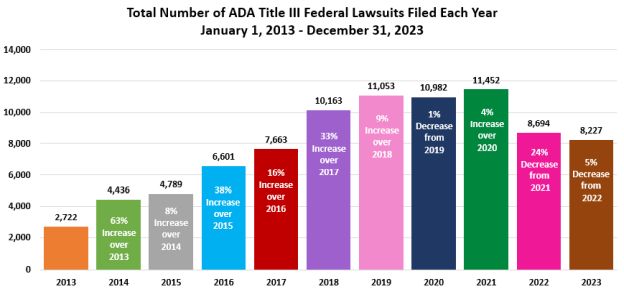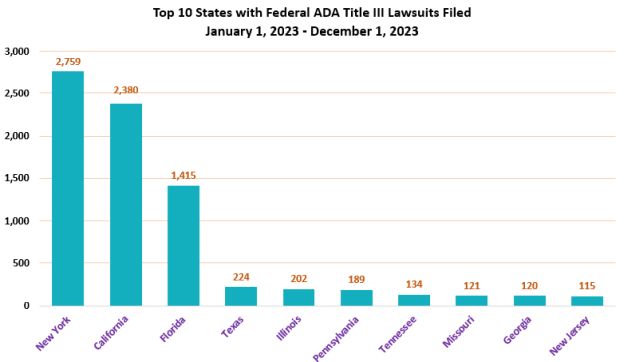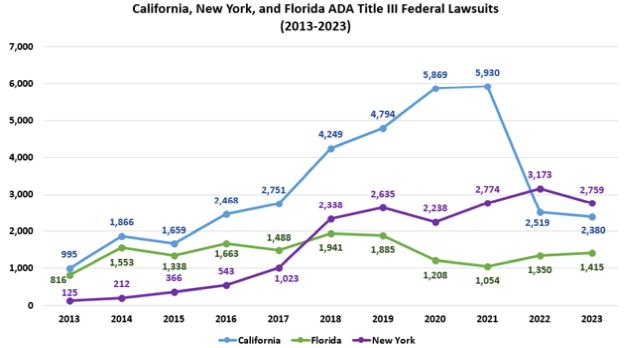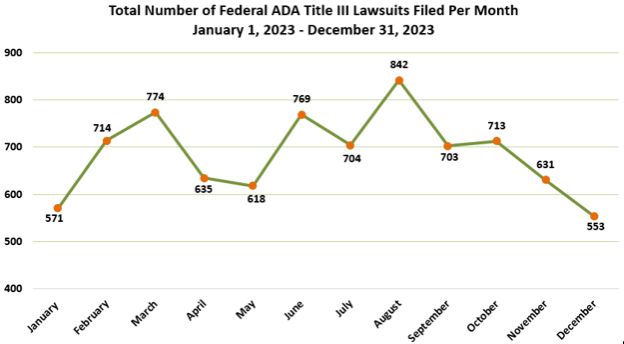Seyfarth Synopsis: In 2023, the number of ADA Title III lawsuits filed in federal court declined but still exceeded 8,200 for a second year in a row.
From 2013 to 2021, federal court ADA Title III case filings climbed steadily to a staggering 11,452 in 2021. The number of filings fell dramatically by 24% in 2022, and then declined another 5% to 8,227 in 2023. That said, this is still a very big number and triple the number of cases filed in 2013 when we first started tracking these lawsuits.

[Total Number of ADA Title III Federal Lawsuits Filed Each Year January 1, 2013 – December 31, 2023: 2013: 2,722; 2014: 4,436 63% increase over 2013; 2015: 4,789 8% increase over 2014; 2016: 6,601 38% increase over 2015; 2017: 7,663 16% increase over 2016; 2018: 10,163 33% increase over 2017; 2019: 11,053 9% increase over 2018; 2020: 10,982 1% decrease from 2019; 2021: 11,452 4% increase over 2020; 2022: 8,694 24% decrease from 2021; 2023: 8,227 .5% decrease from 2022]
For the second year in a row New York led the country in ADA Title III federal filings with 2,759 cases. California came in second again with 2,380 filings, and Florida stayed in third place, with 1,415 cases. Of these top three states, Florida was the only one that saw an increase in the number of federal suits from 2022 to 2023.
Rounding out the top ten were Texas (224), Illinois (202), Pennsylvania (189), Tennessee (134), Missouri (121), Georgia (120) and New Jersey (115). All of these states had fewer filings than in 2022, except for Illinois and New Jersey – both of which recorded their highest number of ADA Title III case filings since we began tracking filings in 2013.

[Top 10 States with Federal ADA Title III Lawsuits Filed January 1, 2023 – December 31, 2023: New York: 2,759; California: 2,380; Florida: 1,415; Texas: 224; Illinois: 202; Pennsylvania: 189; Tennessee: 134; Missouri: 121; Georgia: 120; New Jersey: 115]
Two states leaving the Top 10 were Colorado and Massachusetts. Colorado plummeted to only 33 cases, and Massachusetts saw 57 filings. New to the Top 10 chart are Illinois and New Jersey.
At the other end of the spectrum, Alaska, Montana, Nebraska, North Dakota, South Dakota, West Virginia and Wyoming had no filings in 2023. Each year, we have a slightly different list of states, but North Dakota wins the award for no ADA Title III filings going back to 2013.

[California, New York, Florida ADA Tile III Federal Lawsuits 2013-2023: California: 2013: 995; 2014 1,866; 2015: 1,659; 2016: 2,458; 2017: 2,751; 2018: 4,249; 2019: 4,794; 2020: 5,869; 2021: 5,930; 2022: 2,519; Florida: 2013: 816; 2014: 1,553; 2015: 1,338; 2016:1,663; 2017: 1,488; 2018: 1,941; 2019: 1,885; 2020: 1,208; 2021: 1,054; 2022: 1,350; New York: 2013: 125; 2014: 212; 2015: 366; 2016: 543; 2017: 1,023; 2018: 2,338; 2019: 2,635; 2020: 2,238; 2021: 2,774; 2022: 3,173; 2023: 2,380, 2,759, 1,145]
January (571) and December (553) were the least busy times for filings. Considering the number of holidays at that time of the year, and the potential for bad weather in many parts of the US, that's not surprising. However, January 2022 was very busy with 850 filings. August (842) was the busiest month of 2023, followed by March (774) and June (769) – both consistently high filing month in prior years as well. Filings remained steady throughout the year, and consistent with the highs and lows of 2022 in roughly the 550-850 per month range.

[Total Number of Federal ADA Title III Lawsuits Filed Per Month January 1, 2023 – December 31, 2023: January: 571; February: 714; March: 774; April: 635; May: 618; June: 769; July: 704; August: 842; September: 703; October: 713; November: 631; December: 533]
What to make of this data? Are ADA Title III filings going to continue to slow year over year? Or are we seeing the start of a plateau? Or will numbers come roaring back in 2024, making 2022 and 2023 the outliers? Only time will tell, obviously, but here's our thinking.
First, while we do not track state court lawsuit filings due to less reliability in reporting sources, we know anecdotally and from experience that some of the largest filers have moved to filing in state courts instead of federal courts. We saw this in New York, in California, and even in states not historically high in Title III lawsuits like New Jersey. The continued decrease in California filings is particularly striking (from an all-time high of 5,930 in 2021 to 2,380 in 2023). We think there are a number of factors that have contributed to the decrease. First, many California federal judges are routinely dismissing state law claims for damages that plaintiffs like to add to their ADA lawsuits on the theory that they are an end run around more stringent state court filing requirements. These actions have made federal court a less attractive venue for plaintiffs seeking to recover damages which cannot be obtained under the ADA. Second, a prolific Southern California plaintiff's firm split up several years ago resulting in fewer filings.
In Florida, a prolific law firm stopped filing cases after one of its attorneys became the subject of a disciplinary proceeding and was suspended from the practice of law for six months. Some of the unsavory findings from this disciplinary proceeding may have dampened the enthusiasm of some other plaintiff's attorneys to file ADA Title III lawsuits. Nationwide, it is quite possible that we'll see an uptick in filings this year now that the SCOTUS punted on deciding whether plaintiff testers have standing to sue in Acheson v. Laufer. SCOTUS will have another chance to consider the issue if it grants the Petition for Certiorari in Langer v. Kisor, however.
A note on our methodology: Our research involves a painstaking manual process of going through all federal cases that were coded as "ADA-Other," manually culling out the ADA Title II cases in which the defendants are state and local governments, and categorizing them by state. The manual process means there is the small possibility of human error.
The content of this article is intended to provide a general guide to the subject matter. Specialist advice should be sought about your specific circumstances.



